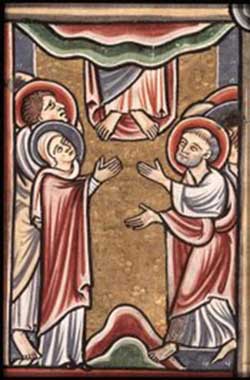“Choose Someone Else!”

Isaiah 6:1-8 (6:8) – May 30, 2021
Have you ever had a really vivid dream? Colorful, psychedelic, surreal, even? Sort of like what we just heard in the Scripture reading this morning. I suspect that people first hearing about Isaiah’s vision from chapter 6 may have thought the prophet was going way overboard with such vivid, descriptive language!
Let’s take a few giant steps back, and gaze upon the big picture of this vision. We see the immense Holy One, and we see little, tiny Isaiah. “God’s presence is so large, the hem of the Lord’s robe alone fills the temple space. This is vastness. Strange but faithful creatures envelop the throne. Smoke obscures the whole scene. We are used to the images of fire and smoke, cloud and height being associated with God. It is all here.” [1]
Some might think that Isaiah was exaggerating a lot when he described the Almighty God, seated on a throne in the heavenly temple. Yet, that vivid, glorious scene from the heavenly temple is the template of what goes on in many worship services today.
The first hymn many people think of when they consider Trinity Sunday is “Holy, Holy, Holy, Lord God Almighty.” This hymn’s verses either refer to or directly quote this Scripture reading from Isaiah 6 – the first line, “Holy, holy, holy,” “Cherubim and seraphim falling down before Thee” and “all Thy works shall praise Thy name in earth and sky and sea.” This Scripture reading from Isaiah does not give us any information at all about the Christian doctrine of the Trinity, but has been used effectively as a backdrop and assist in helping Christians get some understanding of this mystical, almost ethereal doctrine that is so difficult to understand.
What’s this about comparing Isaiah chapter 6 and worship services? Most worship services begin with a hymn of praise. Look at Isaiah 6:3 – “And [the seraphim] were calling to one another: ‘Holy, holy, holy is the Lord Almighty; the whole earth is full of his glory.’” If that isn’t a hymn of praise, I don’t know what is. What’s more, some contemporary churches have several hymns or an extended praise time at the beginning of their services.
Many worship services then move to a confession (or admission) of sin. Let’s check out Isaiah 6:5 – Isaiah cried, 5 “Woe to me! I am ruined! For I am a man of unclean lips, and I live among a people of unclean lips, and my eyes have seen the King, the Lord Almighty.” We here at St. Luke’s Church have a confession of sin at the beginning of every worship service. I consider this vitally important! Just as Isaiah realized his sinfulness in the light of everything happening in that heavenly Temple, so we ought to confess our sins, too. We need to make ourselves clean on the insides before we can possibly come near to God.
After the confession and admission of sin comes an assurance or forgiveness of that sin, in Isaiah 6:6-7 – “Then one of the seraphim flew to me with a live coal in his hand, which he had taken with tongs from the altar. 7 With it he touched my mouth and said, ‘See, this has touched your lips; your guilt is taken away and your sin atoned for.’” Just as we follow the prayer of confession in our worship with the assurance of pardon – Believe the Good News of the Gospel! In Jesus Christ, we are forgiven!
This template for the worship service from Isaiah does not have a reading of Scripture, but many other instances in the Hebrew Scriptures do, where the minister gives further instruction and exhortation using the Scripture. (This is exactly what I am doing right now! Exhorting the congregation, based on the Word of God.) What follows is all-important, the whole point and reason for it all! Isaiah 6:8 holds a call to service extended from the Lord God Almighty. This call is the focal point of the retelling of this vision. “I heard the voice of the Lord saying, “Whom shall I send? And who will go for us?” And I said, “Here am I. Send me!”
When I first felt that call from God, I was in my early 20’s, attending an evangelical Christian college as a music major. Women were definitely frowned upon as ordained clergy. I heard that call, and I even reflected upon it, turned it over in my head and heart, and talked about it with some other students at my school. However, not much came of it – then – yet.
As we take a look at another call narrative, the one from Exodus 3 involving Moses and the burning bush, we get a whole different response to the question “Whom shall I send? And who will go for us?” Moses certainly does not want to lead the people of Israel! “Choose somebody else!” is his response. And, even after God says God will empower Aaron as Moses’ right-hand man, Moses still drags his feet.
Isn’t that like us, sometimes? Don’t we often drag our feet when God calls? Aren’t we more likely to say, “Choose somebody else!” when God taps us on the shoulder?
When you and I hear the Word of God rightly divided and expounded, when we breathe in the Holy Spirit-inspired Word, that divine response and possibility is there, for all members of the congregation, for each believer in the Good News. The heavenly touch of the Holy Spirit may well come upon each of us, bursting forth into fiery life! That Trinity, that Triune God can empower you and me, and help us to do things, to say words, to dream dreams that go far beyond what we could even think or imagine – like Isaiah.
Yes, worship is wonderful, and the Lord has great joy in the worship of God’s people! Yet, what is the focal point of worship? Responding to the call of God. When God calls, can you respond, “Here am I, send me!” That is what God truly wants, an open heart, and a willing spirit.
Say with me, with Isaiah, “Here am I, send me!”
(Thank you to John Holbert for his Patheos commentary from 2015. I took several extended ideas from that article. https://www.patheos.com/progressive-christian/choose-somebody-else-john-c-holbert-05-28-2015
“Choose Somebody Else!” John C. Holbert, Opening the Old Testament, 2015. )
(Suggestion: visit me at my other blogs: matterofprayer: A Year of Everyday Prayers. #PursuePEACE – and A Year of Being Kind . Thanks!
[1] https://www.workingpreacher.org/commentaries/revised-common-lectionary/the-holy-trinity-2/commentary-on-isaiah-61-8-3
Commentary, Isaiah 6:1-8, Melinda Quivik, Preaching This Week, WorkingPreacher.org, 2012.




